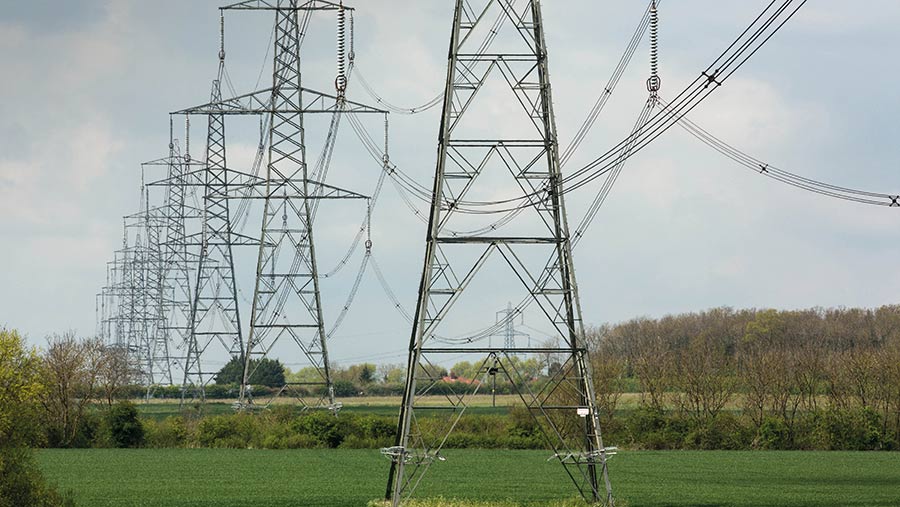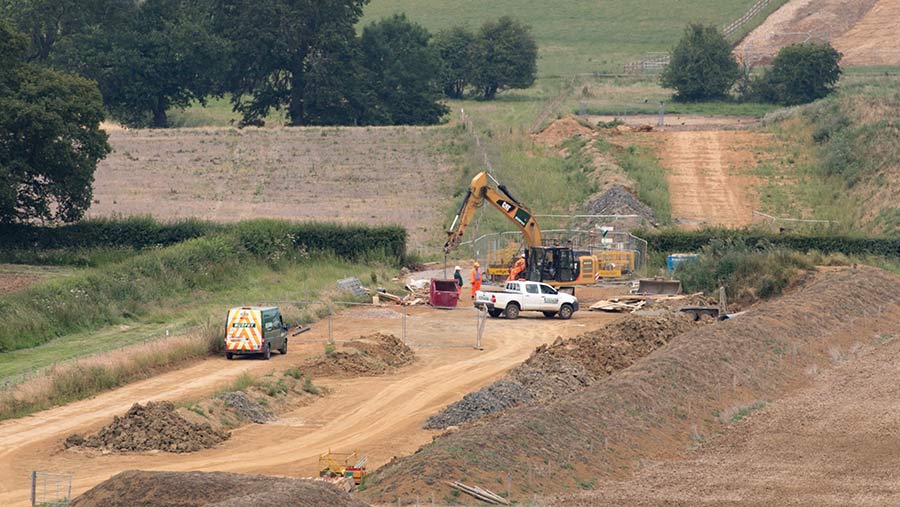A guide to reclaiming professional fees paid by farmers
 © Tim Scrivener
© Tim Scrivener Many farmers will be affected by compulsory purchase or by utility companies seeking to acquire rights over land to install new pipelines or cables.
This is a complex area and it can be a stressful process to reclaim what is rightly due, so using a professional, qualified in a particular specialism, is likely to be necessary.
See also: Compulsory purchase of farmland explained
In the instances outlined, it is normally the case that the landowner’s professional fees will be covered by the acquiring authority, although there can be some catches.
For land subject to compulsory purchase the rules are broadly that the farmer will get paid for any loss of value in the land, but also for “disturbance and other matters”, says Jeremy Moody, secretary and adviser to the Central Association of Agricultural Valuers (CAAV).
There are provisions for 90% of an estimated compensation payment to be made in advance, which is based on a prudent assessment of the compensation, with the fee forming part of that compensation.
“Fees fall under the disturbance category, with the world generally appreciative that someone who is being adversely affected by the use of statutory powers needs to take professional advice and get support for any negotiation for compensation,” says Mr Moody.
‘Misunderstood’
This is an area which is quite often misunderstood, as the approach has changed over the years, he adds.
Historically, the acquiring authority would typically determine the fee payable based on a particular scale and pay it direct to the land agent dealing with the case.
However, scale fees have generally been phased out on as they can be considered anti-competitive. Also, acquiring authorities are looking much harder at their own budgets.
Instead, the fee is properly treated as part of the claimant’s loss for which they are seeking compensation from the acquiring authority.
“This is where old custom and practice comes unstuck,” says Mr Moody. “Now the claimant has to pay [the professional fees] and then propose them for recovery from the acquirer.
“If the authority is being very strong this can leave the claimant out of pocket for fees that are properly due, but the acquiring authority won’t properly recompense.”
Best practice is for the professional to agree the fee basis in the terms of engagement before the work starts and that will then form part of the farmer’s claim.
There is case law which puts an obligation on the acquiring authority to repay “reasonable fees, reasonably incurred”.
An added complication is that only the fees for post-compulsory purchase issues are recoverable.
“Take a road scheme. You may actually find the most productive time to achieve things, particularly in terms of negotiating accommodation works, is to do so before the compulsory purchase order (CPO) is even drafted,” says Mr Moody.
“But these fees are not generally recoverable as they are not seen to be part of the compulsory purchase.”
Some authorities allow for some element of fees at that point to be covered because they recognise that they will be saving themselves problems further down the line if they iron out problems before the CPO is issued.
However, not everyone takes that view.
“The farmer could be facing a bill that the acquiring party might not pay and theoretically that could run into tens of thousands of pounds should they want to go to an inquiry to resist the order.”
In many compulsory purchase cases, simply getting compensation for the loss of land may not prove the most important part of the equation and this is where a professional advisor can help with negotiations.
For example, a claimant may be better served by negotiating accommodation works like the creation of a bund along the side of the road to reduce noise, or a bridge across the road so they can reach land on the other side more easily.
Although these measures will reduce the level of compensation on offer, they could be more beneficial to the claimant overall.

© Tim Scrivener
Utility companies
The different types of utility companies – gas, electricity or water – generally work in a similar way, although the scale of their powers is different.
Technically, water companies for example, can come through land with just seven days’ notice because historically their work has been seen of high importance to public health..
Utility companies are more likely to try to insist on using a scale for the payment of professional fees, warns Mr Moody.
“They will typically try to cap what they will reimburse, whether by a scale or a set figure and you will need to argue to go beyond that, which could be hard work.”
A land agent will help ensure the farmer’s rights are protected and that they are compensated fairly for things such as crop losses while work is being carried out, future crop losses, cost of restoration, hedge or fence repairs and reinstatement of land drains.
Other issues which will need consideration include the potential impact of the work on any planned developments by the farmer.
Mr Moody points to an imbalance of power when it comes to dealing with utility companies.
At present, if a claimant is unhappy about the compensation on offer, then their only recourse is to take the case to the Upper Tribunal, which most small landowners are unlikely to want to do because of effort, formality, cost and risk.
However, Liam Fox, Conservative MP for North Somerset, has recently introduced a private members’ bill to promote alternative dispute resolution for compensation for electricity schemes, which has had some government backing.
Telecoms
Telecoms are slightly different in that there is no statutory basis on which a farmer can claim for their professional fees until their case reaches tribunal, which most cases do not.
In practice, as part of their negotiations most network operators tend to say they will pay the claimant’s fees up to a certain point, but this will need to be agreed up front.
As with utilities, it is often the terms of the agreement, rather than the headline rental figure, which will make the most difference to the farmer.
“The role of the adviser may not be about the headline compensation amount, but the wider issues,” says Mr Moody.
“They will be asking: How do you, the affected person, come out of this the best you can?”
Limited scope for recovery of fees for insurance claims work
Getting professional fees covered when advice is needed in relation to an insurance claim can be much harder, says Mr Moody.
For example, a farmer may have to deal with an insurance claim if a car comes through a hedge into a field.
Some policies will include cover for land agent fees, but by no means all, says Mr Moody.
“Unless it is in the policy, insurance companies can be quite reluctant about recognising this as they want to keep their liabilities down.”
Compulsory purchase order review
The government has recently asked the Law Commission to review the compulsory purchase regime and the laws of compensation with a view to modernising and simplifying the legislative regime.
